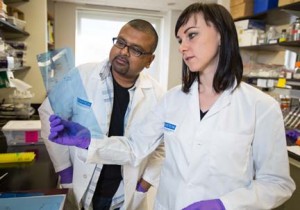
Kartik Chandran ’95 reviews data with a colleague. Photo courtesy Albert Einstein College of Medicine
The team of researchers led by Kartik Chandran ’95, which managed to break open Ebola’s previously elusive mechanism for entering a cell, is continuing to work on antibody therapeutics for the virus.
Chandran, associate professor of microbiology and immunology at Albert Einstein College of Medicine, hopes to develop an anti-Ebola therapeutic within five to six years.
Since the outbreak of Ebola in Africa during the summer, he has been featured in The New York Times and other national media for his expert advice and commentary.
Read a recent CBS News article featuring commentary by Chandran
Chandran’s team is working in cooperation with a worldwide public-private consortium to develop inhibitors that target the two classes of Ebola host factors they helped discover—cysteine cathepsin proteases and the viral receptor Niemann-Pick C1 (NPC1).
“We have promising initial data on both fronts, and hope to run tests in monkeys soon, for protection against Ebola virus,” he says. “We are also working to develop antibody therapeutics against the virus and its relatives, such as Marburg virus. This is a systematic approach to find antibody cocktails like ZMapp, whose discoverers are a part of our international team.”
The discovery of how the virus enters a cell was first described in two articles by Chandran and his colleagues in Nature and also publicized by Reuters and other media. In addition, his lab received a $4.8 million grant from the National Institutes of Health in support of the research.
“Lafayette took a chance on a 17-year-old from India and that made everything possible for me,” says Chandran, a biochemistry graduate who holds a doctorate in biochemistry from University of Wisconsin.
